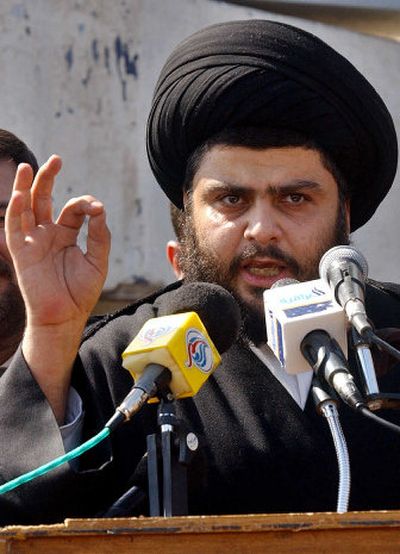U.S. official says al-Sadr fled to Iran

WASHINGTON – Anti-American cleric Muqtada al-Sadr fled Iraq for Iran ahead of a security crackdown in Baghdad and the arrival of 21,500 U.S. troops sent by President Bush to quell sectarian violence, a senior U.S. official said Tuesday.
Al-Sadr left his Baghdad stronghold some weeks ago, the official said, and is believed to be in Tehran, where he has family. The official, speaking on condition of anonymity to discuss U.S. monitoring activities, said fractures in al-Sadr’s political and militia operations may be part of the reason for his departure. The move is not believed to be permanent, the official said.
Word of al-Sadr’s departure coincides with an announcement that Iraq will close its borders with Iran and Syria for 72 hours as part of the drive to end the violence that has threatened to divide the capital along sectarian lines.
The U.S. official said it is not clear how firmly the radical Shiite cleric is controlling his organization and the associated Mahdi Army militia from exile.
“The question for us is to what extent his organization is going to participate in the political process,” the official said, referring to al-Sadr’s on-again, off-again relationship with the fragile democratic government in Baghdad.
Al-Sadr’s departure was reported by several television networks Tuesday.
Al-Sadr’s militia is widely seen as the main threat to Iraq’s unity and high on the list of targets for the Baghdad security operation.
A ragtag but highly motivated militia that fought U.S. forces twice in 2004, the Mahdi Army is blamed for much of the sectarian strife shaking Iraq since a Shiite shrine was bombed by Sunni militants a year ago. U.S. officials have for months pressed Shiite Prime Minister Nouri al-Maliki to move against the militia, but he has so far done little to comply, largely because he does not want to lose al-Sadr’s support.
Al-Sadr rose from obscurity in the aftermath of Saddam Hussein’s ouster to lead a movement of young, underprivileged Iraqis united by opposition to U.S. military presence as well as hunger for Shiite domination.
The cleric, who is in his mid-30s, is a master of street politics, and his young lieutenants can rally tens of thousands of protesters at short notice.
Once wanted in the 2003 killing of a key cleric, al-Sadr gained much influence when his parliamentary bloc of 30 of 275 deputies was instrumental in al-Maliki’s election.
Dismissed by older Shiite politicians as a dangerous upstart, al-Sadr set up the Mahdi Army in 2003. It is suspected of being behind the abduction and murder of thousands of Sunnis in what are known as death squad killings.
Two key members of al-Sadr’s political and military organization were gunned down last week, the latest of as many as seven key figures in the al-Sadr organization killed or captured in the past two months. The deaths and captures came after al-Maliki, also a Shiite, dropped his protection for the organization.